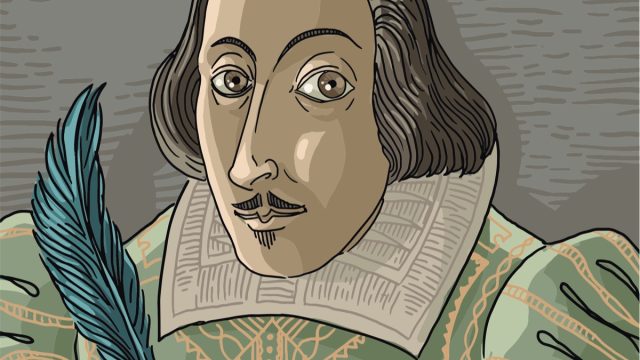This Is the Surprising Literary Origin of the Knock-Knock Joke
Who's there? William Shakespeare!

Chances are, one of the first jokes you ever learned started with the world's most famous opening setup: "Knock Knock." And while knock-knock jokes have engrained themselves in the American culture in a way no other genre of joke has been able to since, it hasn't always been that way. In fact, despite having centuries-old roots, these jokes only gained popularity in the early 1930s.
But before we get to the knock-knock joke's meteoric rise in popularity, it's important to acknowledge the format's earliest appearance. It turns out, the first-known occurrence of a knock-knock, who's-there dialogue came from the Bard himself: William Shakespeare.
Here it is in Act 2, Scene 3 of Macbeth.
Knock, knock! Who's there, i' the name of
Beelzebub? Here's a farmer, that hanged
himself on the expectation of plenty: come in
time; have napkins enow about you; here
you'll sweat for't.
Knock, knock! Who's there, in the other devil's
name? Faith, here's an equivocator, that could
swear in both the scales against either scale;
who committed treason enough for God's sake,
yet could not equivocate to heaven: O, come
in, equivocator.
Obviously, the Bard's knock-knock scene wasn't meant to be funny—and his 17th-century audiences didn't leave the performance gleefully pretending to knock on each other's doors. Still, it was a start.
The next rendition of the knock-knock joke didn't appear until around 1900. And even then, the format was a bit different. This time, the joke started with the phrase "Do you know?" For example, the following joke was a popular one, wrote journalist Merely McEvoy in a 1922 issue of the Oakland Tribune, as reported by NPR:
Do you know Arthur?
Arthur who?
Arthurmometer!
By 1936, "do you know" jokes had officially morphed into knock-knock jokes, and Americans couldn't get enough of them. That year, one newspaper advertisement for a roofing company gave us another published example of the knock-knock joke. Here was their quip:
Knock, knock.
Who's there?
Rufus.
Rufus who?
Rufus the most important part of the house!
"You can't turn the radio on anymore without getting one of the Knock-Knock gags," claimed a newspaper columnist in July of that year. "They're fun and when some of the better orchestras perform them, they're screams. But you've probably found that out for yourself." (Swing orchestras would incorporate knock-knock jokes into the audience-participation segments of their acts.)
Part of the jokes' 1936 virality stemmed from the fact that the Col. Frank Knox was selected as the running mate for that election year's Republican presidential candidate, Alf Landon. And everyone knows that making fun of politicians' names is always a blast.
Throughout the tail-end of the '30s, knock-knock jokes reached a fever pitch. And like everything that gets a tiny bit too popular, people began debating their merits. Namely, whether or not they were actually funny and whether or not people who enjoyed them were actually intelligent.
In one widely circulated editorial, D.A. Laird, the director of the Rivercrest Psychological Laboratory at Colgate University, alleged that knock-knock jokes could be categorized along with other types of "absurd stunts which became crazes and which occupied the main interests of thousands of young people." Harsh!
Regardless, knock-knock jokes stuck. And whether they make you laugh or groan, they're probably not going anywhere anytime soon. So the next time someone hits you with a "Knock Knock," don't get too aggravated. After all, it's Shakespeare. And if you're in the market for even more bizarre trivia, check out these 40 Random Obscure Facts That Will Make Everyone Think You're a Genius!





















